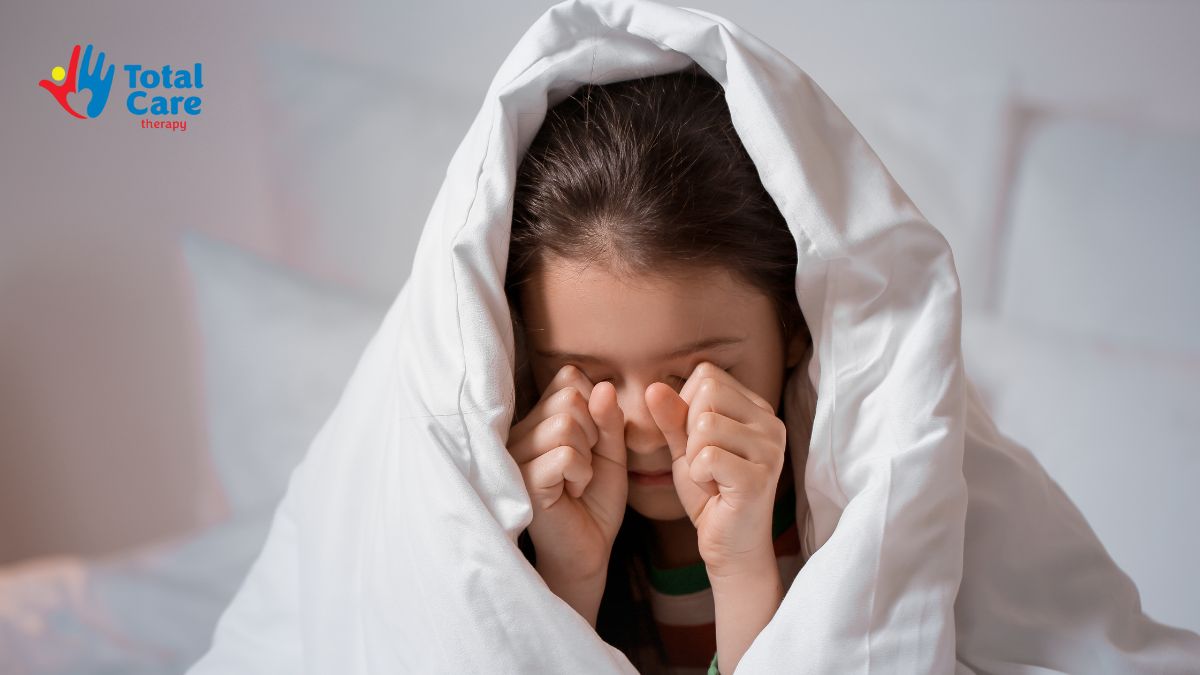The Connection Between Autism and Sleep Disorders: What Parents Should Know
Autism and sleep disorders often disrupt routines, mood, and learning for kids and families. Find practical solutions and ABA therapy support across Tennessee.
The Connection Between Autism and Sleep Disorders: What Parents Should Know
Key Points:
- Autism and sleep disorders connect through chronic issues like delayed sleep, frequent waking, and early rising.
- Up to 80% of autistic children face these problems, linked to sensory sensitivities, melatonin differences, anxiety, and routine disruptions.
- Poor sleep worsens mood, learning, and family stress, making treatment essential.
Bedtime can feel like the hardest part of the day when a child takes hours to fall asleep, wakes repeatedly through the night, or rises long before dawn. For many families, these patterns are ongoing struggles.
Up next, you’ll see how different factors contribute to these challenges and what approaches can ease the burden for both children and parents.

Autism Sleep Problems Go Beyond Occasional Restlessness
Sleep issues in autism are not rare disruptions. They are chronic challenges. Research shows that between 40% and 80% of autistic children deal with consistent sleep difficulties, far more than their peers. This means many families experience bedtime battles as a nightly pattern rather than a once-in-a-while issue.
Common sleep issues in autism include:
- Delayed sleep onset, where it takes a long time to fall asleep
- Frequent night waking that interrupts rest for both child and parent
- Early morning waking, leaving the child under-rested
- Shorter total sleep duration than recommended for their age
These patterns affect mood, learning, and daytime behavior, which can already be areas of concern for children with autism.
Why Sleep Disorders Are Common in Autism
1. Sensory processing and sleep disruptions
Children with autism often experience heightened sensory responses. A slight sound, the feel of clothing tags, or changes in light can make it hard to relax at bedtime. For some, sensory-seeking behaviors, like rocking or vocalizing, also delay sleep.
2. Circadian rhythm differences
Studies show that children with autism may have irregular melatonin production, which makes it harder for the brain to know when to “switch off.” This biological difference explains why some children stay wide awake late into the night or wake too early.
3. Anxiety and repetitive thinking
Worries and repetitive thought loops can keep children alert. Anxiety is often linked to difficulty both falling asleep and staying asleep. Parents sometimes notice their child repeating phrases or scripts long after bedtime, a sign of an overactive mind.
4. Routine dependence
Children with autism often thrive on structure. When bedtime routines are disrupted, even slightly, the stress can make it much harder to wind down. Changes like vacations, illness, or moving bedrooms may trigger new sleep struggles.
Autism and Insomnia: A Frequent Struggle
Among sleep challenges, insomnia stands out as one of the most reported. That means difficulty either initiating or maintaining sleep is a major concern for families.
Insomnia does not exist in isolation. When children sleep poorly, daytime outcomes worsen. Families often report:
- Irritability and emotional outbursts
- Lower attention span
- Learning challenges at school
- Stress in sibling and family relationships
The cycle is hard to break, since poor sleep heightens anxiety, which in turn worsens bedtime resistance.
Evidence-Based Autism Insomnia Treatment
Behavioral approaches offer the most consistent results. A review of sleep interventions in autism showed that around 80% of behavioral-based programs reduced sleep problems. Unlike medication, these strategies build lasting habits.
Key strategies include:
- Bedtime routines: Consistent steps (bath, pajamas, book, lights out) signal the body it’s time to rest.
- Positive reinforcement: Reward systems motivate children to stay in bed or follow routines.
- Gradual withdrawal: Parents slowly reduce presence in the room, encouraging independent sleep.
- Environmental adjustments: Blackout curtains, white noise machines, or weighted blankets can help.
For families who want support in dealing with autism and sleep disorders, applying these strategies, ABA therapy provides structured, personalized plans.
How ABA Therapy Addresses Autism and Sleep Disorders
Applied Behavior Analysis (ABA) is best known for targeting social, communication, and behavioral skills. But it can also be highly effective in addressing sleep. Sleep-related programs typically include:
- Identifying specific triggers for bedtime resistance or night waking
- Teaching relaxation skills, such as breathing or calming routines
- Reinforcing desired behaviors, like staying in bed after lights out
- Collaborating with parents to track patterns and adjust strategies
When provided as ABA therapy at home, these strategies fit naturally into daily life. Therapists observe the bedtime environment, guide parents, and model interventions in real time. Families searching “ABA therapy near me” often find that providers can help address both daytime behavior and nighttime struggles.
In locations frequently searched, such as ABA therapy in Indiana, ABA therapy in North Carolina, and ABA therapy in Georgia, many programs now emphasize the link between sleep and overall progress. By improving rest, ABA interventions often amplify gains in communication, focus, and social interactions during the day.
Sensory Processing and Sleep: Practical Parent Tips
Because sensory factors are so common in sleep issues in autism, adjusting the environment is often the first step. Parents can experiment with:
- Weighted blankets or compression sheets for calming input
- Temperature control to avoid overheating, which is a frequent discomfort
- Soft, tag-free clothing for sensitive skin
- White noise or rhythmic sounds to block unexpected disruptions.
Each child’s sensory profile is unique, so some strategies may work better than others. Observing responses and adjusting over time helps create a personalized sleep environment.
When to Seek Professional Help
Parents should consider professional help if:
- The child regularly takes more than 30–40 minutes to fall asleep.
- Night wakings happen several times a week.
- Sleep deprivation clearly affects daytime mood, learning, or family stress.
- Home strategies and routines fail after consistent effort.
Specialists may recommend a comprehensive plan that combines behavioral strategies with medical evaluation to rule out conditions like sleep apnea, reflux, or seizures, which can also impact rest.
Autism and Sleep Disorders Affect Growth and Development
Poor sleep has long-term consequences. One national survey reported that children with developmental disabilities, including autism, are twice as likely to have chronic sleep problems compared to typically developing peers. This highlights the importance of addressing sleep early rather than waiting for children to “outgrow it.”

Frequently Asked Questions
Does autism cause sleep problems?
Autism does not directly cause sleep problems, but up to 80% of autistic children experience them. Common issues include insomnia, long sleep onset, night wakings, and circadian rhythm differences. Anxiety, sensory sensitivities, and melatonin irregularities contribute, making screening and treatment essential.
How much sleep does an autistic child need?
An autistic child needs the same amount of sleep as peers, based on age. Recommended ranges are 12–16 hours for 4–12 months, 11–14 hours for 1–2 years, 10–13 hours for 3–5 years, 9–12 hours for 6–12 years, and 8–10 hours for 13–18 years. Routines support meeting these targets.
Are autistic children more likely to have night terrors?
Autistic children may have more night terrors, but evidence is mixed. Some studies show higher parasomnia rates, while reviews find no consistent increase compared with peers. Because prevalence varies by study, recurrent or harmful episodes in autistic children should lead to pediatric sleep evaluation.
Strengthen Sleep and Daily Routines with Expert Support
Families searching for effective help do not need to face sleep struggles alone. Total Care ABA offers autism therapy services that integrate sleep and behavior strategies across Tennessee, Indiana, Georgia, North Carolina, New Mexico, Arizona, Maine, and Utah.
By tailoring programs to your child’s needs, we focus on building better routines, reducing nighttime stress, and improving overall family well-being.
At Total Care ABA, our therapists use evidence-based tools to help children overcome resistance, develop calming skills, and strengthen daily functioning. Get in touch now to learn how personalized ABA therapy can restore peace at night and brighter energy during the day.


.svg)
.svg)







